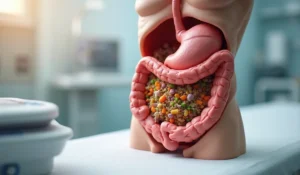Stress can affect your cholesterol levels more than you might think. Research shows that long-term stress can raise your LDL (“bad”) cholesterol and lower HDL (“good”) cholesterol by a lot.
Your heart health depends on how stress and cholesterol work together. A major study that looked at 91,500 adults found a direct link between job stress and high cholesterol. The evidence gets stronger. Research of 439 professional drivers showed that drivers under high work stress had more LDL cholesterol, higher triglycerides, and less HDL cholesterol. These findings prove that stress can affect cholesterol levels both directly and indirectly.
This piece will get into how stress changes your body chemistry and what science tells us about it. You’ll learn practical ways to handle stress and protect your heart health better. Many people wonder if their stressful life affects their cholesterol levels. The evidence-based information here will help you understand the connection better.
How stress changes your body chemistry
Your body goes through remarkable biochemical changes during stress. These physiological responses evolved as survival mechanisms. They can negatively affect your cholesterol levels when stress persists.
The role of cortisol and adrenaline
Stressful situations activate your hypothalamic-pituitary-adrenal (HPA) axis, which releases two main stress hormones: cortisol and adrenaline (epinephrine) [1]. These hormones get your body ready for “fight-or-flight” by raising your heart rate, blood pressure, and alertness [2].
Both cortisol and adrenaline trigger cholesterol production directly [1]. Research on college students during exam periods showed clear increases in serum cortisol, adrenaline, total cholesterol, HDL-cholesterol, and LDL-cholesterol compared to regular periods [3]. Scientists also found a strong link between cortisol levels and cardiac risk factors before exam stress [4].
What is hemoconcentration and why it matters
Hemoconcentration is a vital mechanism behind stress-induced cholesterol increases. Your blood loses fluid during acute stress, which makes blood components—including cholesterol—more concentrated [5].
Studies back this up: stressed subjects showed higher total cholesterol, LDL, and HDL cholesterol levels along with increased hematocrit, hemoglobin, and reduced plasma volume compared to control groups [6]. Scientists found that after adjusting for hemoconcentration mathematically, the stress-related rises in total, HDL, and LDL cholesterol disappeared. This confirms hemoconcentration as the main reason for acute cholesterol elevation during stress [7].
Short-term vs long-term stress effects
Stress duration strongly affects your body chemistry. Acute stress leads to temporary cholesterol increases through hemoconcentration and sympathetic activation [8]. These changes usually go away once the stressor disappears.
Long-term stress creates lasting hormonal imbalances with serious effects [9]. Constant high cortisol levels can cause:
- Higher triglycerides and LDL (“bad”) cholesterol
- Lower HDL (“good”) cholesterol
- Damage to the endothelial layer of arteries
- More inflammation and atherosclerosis
These physical changes raise your risk of cardiovascular disease substantially over time [2]. Understanding stress’s effects on your body chemistry helps explain the link between psychological well-being and heart health.
How stress indirectly raises cholesterol
Stress changes our behavior and negatively affects cholesterol levels. These lifestyle changes create a path where stress raises cholesterol without direct biochemical involvement.
Emotional eating and poor diet choices
Hormonal changes from stress push many people to eat unhealthy “comfort foods.” Research shows stressed people tend to eat more unhealthy foods and skip healthy options [2]. Your body’s stress hormone cortisol makes you crave foods high in fat or sugar [2].
This creates a dangerous cycle. A study of people with hypertension and weight issues found anxiety affected total cholesterol and LDL cholesterol through emotional eating [10]. Emotional eating pushes people to eat more sugary and high-fat foods [11]. These eating habits and extra weight put emotional eaters at higher risk of heart disease [11].
Reduced physical activity
People lose motivation to exercise when stressed, which affects their cholesterol levels. Many abandon their exercise routines that could help manage cholesterol during stressful times.
A study of 30 million Fitbit users showed fewer average steps during stressful periods [12]. This lack of movement changes how your body works, causing:
- Reduced glucose tolerance
- Insulin resistance
- Reduced lipid clearance
- Decreased HDL levels
- Systemic inflammation [12]
Research showed that stopping exercise increased LDL cholesterol by 15.8% and raised total cholesterol [12].
Increased smoking and alcohol use
People often turn to unhealthy habits when stressed. More than 85% of smokers drink alcohol, and drinkers are 75% more likely to smoke than non-drinkers. These combined habits take a toll on cholesterol [13].
Smoking damages blood lipid profiles – smokers have lower HDL-C levels and higher triglycerides than non-smokers [14]. Female smokers have 1.41 times higher odds of poor cholesterol metrics compared to non-smokers [14].
A glass or two of alcohol might increase HDL levels, but heavy drinking – often triggered by stress – raises triglycerides and blood pressure, especially in men [13].
What the research says about stress and cholesterol
Research shows a strong connection between stress and cholesterol levels in people of all backgrounds.
Key studies linking stress to high LDL and low HDL
A detailed study of 91,500+ adults from different professions revealed a strong link between job stress and high cholesterol, including elevated LDL and reduced HDL levels [15]. Research that looked at 439 bus, truck, and taxi drivers showed those under high work stress had higher LDL cholesterol and triglycerides with lower HDL cholesterol [15]. These results match another study that tracked 200 middle-aged people with high cholesterol for three years. The study confirmed that people under more stress managed to keep higher cholesterol compared to those who felt less stressed [15].
Occupational stress and cholesterol levels
Job stress affects cholesterol through several pathways. Scientists divided participants into five groups based on physical and psychological stress exposure. Their results showed psychological stress was a major risk factor that raised triglycerides and LDL while lowering HDL [16]. The risk stayed highest in groups under psychological stress, even after adjusting for BMI and age [16]. The Brief Job Stress Questionnaire revealed something interesting – higher work stress actually linked to lower LDL-C (-7.12 mg/dl per standard deviation increase) and LDL-C/HDL-C ratio (-0.16 mg/dl) [17]. This points to a complex relationship that changes based on the type and length of stress.
Stress in students and young adults
College students’ experiences clearly show how stress affects cholesterol. A study of 208 young college students revealed much higher levels of cortisol, adrenaline, total cholesterol, HDL-cholesterol, and LDL-cholesterol during exams compared to regular periods (P = 0.001, 0.013, 0.0001, 0.0001 and 0.0001, respectively) [18]. Scientists found a strong positive link between cortisol and TC/HDL ratio (cardiac risk factor) before exam stress [18]. Research also showed that insomnia, which often comes from stress, had a negative effect on HDL-cholesterol (β = -0.45, p = .03) among college students [19].
Ways to manage stress and protect your heart
Your heart health and cholesterol levels depend on how well you handle stress. Scientific research shows that lifestyle changes can lower your stress levels and improve your cholesterol profile by a lot.
Exercise and physical activity
Physical activity stands out as one of the best ways to manage both stress and cholesterol at once. Exercise helps eliminate harmful LDL cholesterol by boosting HDL cholesterol levels [20]. The American Heart Association suggests doing aerobic exercise at least 30 minutes a day, five to seven times every week [20].
You should target 150 minutes of moderate-intensity aerobic exercise weekly. Another option is 75 minutes of vigorous activity [21]. Research shows that people with type 2 diabetes and high blood pressure who swam for 16 weeks saw their lipid levels drop significantly [21].
New to exercise? Start with 15-minute sessions and slowly work your way up to about 200 minutes each week [20]. Simple activities like walking, running, cycling, and swimming help reduce your LDL cholesterol levels effectively [21].
Mindfulness, meditation, and breathing techniques
Modern research reveals strong links between meditation and heart health. A 2024 study found that regular meditation helps lower triglycerides and cholesterol [2]. More compelling evidence comes from a meta-analysis that showed meditation reduced cholesterol by about 14 mg/dL on average. The effect on triglycerides was even more dramatic with a 32.56 mg/dL reduction [22].
Deep, slow breathing can lower your systolic blood pressure by up to 10 points [3]. You might want to try this simple technique: breathe in through your nose while counting to five, then exhale for five counts [3]. This simple practice triggers your “rest and digest” response and lowers stress hormones like cortisol and adrenaline [4].
Healthy eating habits
Stress often leads to poor food choices that raise cholesterol. A healthy diet rich in plant-based foods helps control both stress and cholesterol. Your body needs 10-25 grams of soluble fiber daily from foods like beans, lentils, apples, and oats. This fiber binds cholesterol and removes it from your system [5].
Keep saturated fat at 5-6% of your daily calories. Cut back on processed meats, full-fat dairy, and fried foods [5]. The Mediterranean Diet offers a better alternative with its focus on fruits, vegetables, whole grains, and lean proteins [5].
Social support and therapy
Social connections play a vital role in managing stress. Research reveals that men who were socially isolated showed higher cholesterol responses to stress [23]. However, social support helps college students stay active and reduces time spent sitting [24].
Strong social connections and conversations with trusted friends reduce stress and boost emotional health [25]. You might benefit from joining community groups, exercise classes, or therapy sessions. These activities create a support network that protects against stress-related cholesterol increases [26].
Conclusion
Stress without doubt affects how your body manages cholesterol. This happens through direct biochemical pathways and changes in behavior. Studies show that long-term stress increases LDL cholesterol and lowers protective HDL levels – a combination that puts your heart at risk. This pattern shows up in a variety of groups, from working professionals to students during exam time.
You can fight back against these effects. Your body responds well to activities that reduce stress. Exercise stands out as one of the best tools, especially when you have to deal with stress hormones and want to improve your cholesterol levels. Recent studies suggest meditation can help too, potentially lowering cholesterol by about 14 mg/dL.
What you eat and who you spend time with play key roles. A Mediterranean diet rich in plant foods helps you avoid stress-related food cravings. Strong friendships and family connections give you the emotional strength to handle daily stress better.
Stress management is a vital part of heart health that many people overlook. Research shows that taking care of your mental well-being works just as well as traditional ways to manage cholesterol. The steps you take today to reduce ongoing stress will improve your cholesterol levels, heart health, and quality of life in the years ahead.
References
[1] – https://www.everydayhealth.com/high-cholesterol/living-with/experts-how-does-stress-contribute-to-cholesterol/
[2] – https://www.healthline.com/health/high-cholesterol/does-stress-affect-cholesterol
[3] – https://www.health.harvard.edu/heart-health/breathing-exercises-to-lower-your-blood-pressure
[4] – https://www.health.harvard.edu/staying-healthy/exercising-to-relax
[5] – https://my.clevelandclinic.org/health/articles/16867-cholesterol–nutrition-tlc
[6] – https://jamanetwork.com/journals/jamainternalmedicine/fullarticle/620270
[7] – https://pubmed.ncbi.nlm.nih.gov/12140348/
[8] – https://pubmed.ncbi.nlm.nih.gov/1558435/
[9] – https://now.optum.com/article/health/high-cholesterol/does-stress-affect-cholesterol
[10] – https://pubmed.ncbi.nlm.nih.gov/28010121/
[11] – https://pmc.ncbi.nlm.nih.gov/articles/PMC10005347/
[12] – https://pmc.ncbi.nlm.nih.gov/articles/PMC8393411/
[13] – https://pmc.ncbi.nlm.nih.gov/articles/PMC6527044/
[14] – https://pmc.ncbi.nlm.nih.gov/articles/PMC7957949/
[15] – https://www.webmd.com/cholesterol-management/stress-cholesterol-link
[16] – https://pmc.ncbi.nlm.nih.gov/articles/PMC5419930/
[17] – https://pmc.ncbi.nlm.nih.gov/articles/PMC8535434/
[18] – https://pmc.ncbi.nlm.nih.gov/articles/PMC4370130/
[19] – https://pubmed.ncbi.nlm.nih.gov/32790499/
[20] – https://health.clevelandclinic.org/does-exercise-lower-cholesterol
[21] – https://www.medicalnewstoday.com/articles/does-exercise-lower-cholesterol
[22] – https://pubmed.ncbi.nlm.nih.gov/38540618/
[23] – https://academic.oup.com/abm/article/37/1/29/4565836
[24] – https://pmc.ncbi.nlm.nih.gov/articles/PMC8024406/
[25] – https://www.heart.org/en/healthy-living/healthy-lifestyle/stress-management/stress-and-heart-health
[26] – https://www.mayoclinichealthsystem.org/hometown-health/speaking-of-health/tips-to-keep-stress-from-hurting-your-heart








